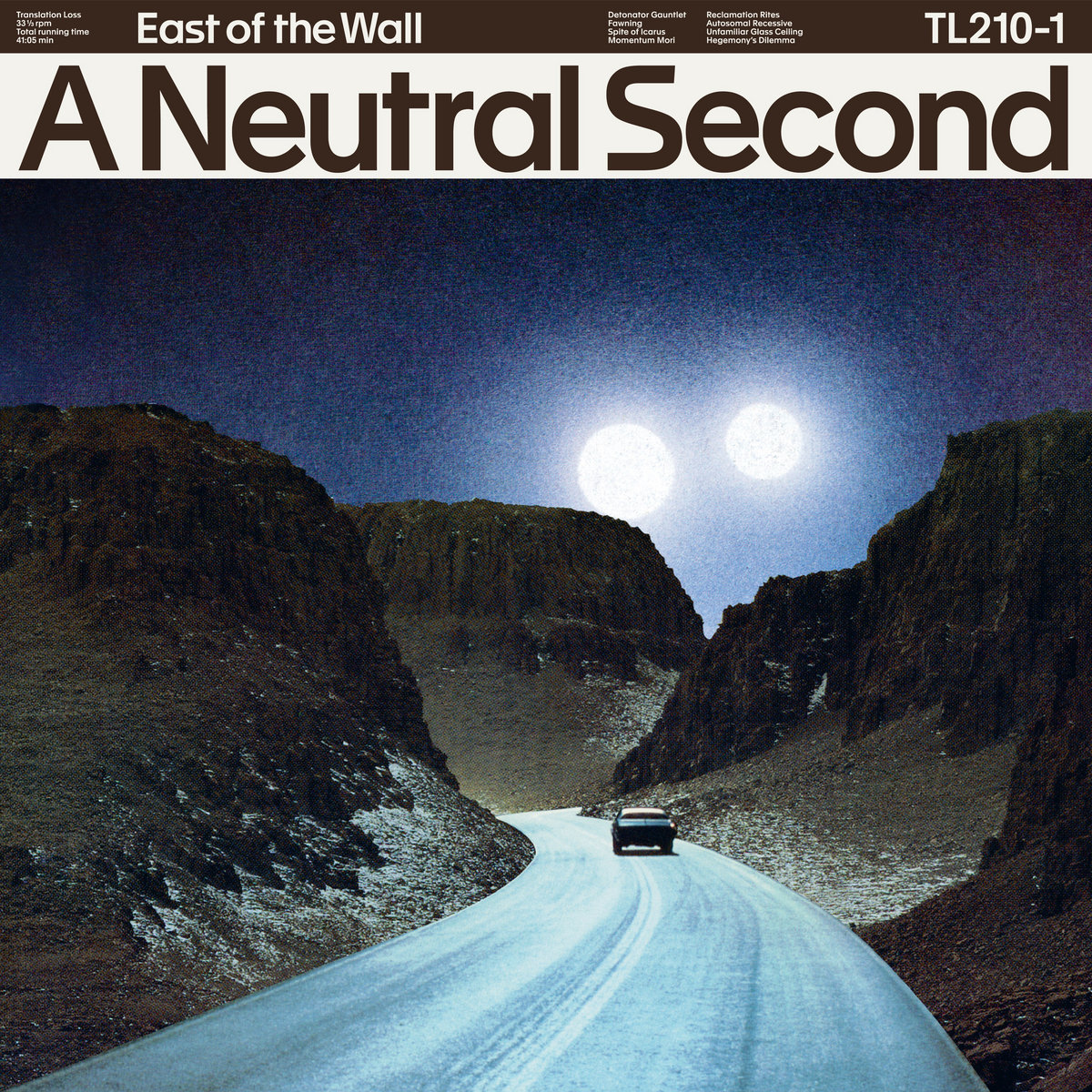
![]()
![]()
![]()
![]()

4½ out of 5
New Jersey progressive metal veterans continue to defy the conventions of their genre with diverse new offering
I’ve long been somewhat of an evangelist for East of the Wall and its many related projects. At a time when heavy complicated music is enjoying an extended surge in popularity, they—along with several of their peers in their relatively obscure northern New Jersey scene—have defied the conventions and cliches of the subgenres they’re often lumped in with. While technicality and adventurous composition are in no short supply, East of the Wall sounds little like anything in the world of overly polished contemporary prog-metal. While they prioritize dense atmosphere and big riffs they display little of the monotony common in too much post- and sludge-metal. Trace their lineage back far enough and you’ll find one foot in the northeast hardcore scene, an influence that while pretty subtle at this point helps explain the authenticity and grit in a sound that draws inspiration from several subgenres without borrowing too heavily from any of them.
I’ll resist the inclination to go too into the weeds on the band’s complicated genealogy, but as I’ve remarked on in reviews of previous records, each East of the Wall record has been recorded following a lineup change. If I had to guess, this probably plays a significant role in the evolution of their style and their output remaining reliably compelling. Each addition to or reshuffling of the band’s membership has correlated with a sonic shift—usually a subtle one but sometimes not, as when they first incorporated vocals following their first LP.
The band has retained some constants over the nearly two decades since its inception (or longer depending how you look at it, more on that below). The rhythm section, currently drummer Seth Rheam and bassist Chris Alfano, continues to juggle time signatures and complex syncopation with ease. The intricate guitar interplay, unconventional harmonic and melodic choices, and abstract lyrics that have long been staples of the band’s sound are all there. There are big melodic payoffs that manage never to come off as predictable or derivative.
A Neutral Second feels in many ways like a continuation of a trajectory set by 2019’s excellent NP-Complete, sharing that record’s focus on accessible but creative melody, sonic texture, and a greater role for clean vocals. However, there are a few noticeable points of evolution. The reincorporation of a third guitarist (Matt Keys, who joined the band after the recording of but prior to the release of NP-Complete) is immediately apparent in the opening seconds of the album. Foregoing any kind of buildup, the record launches directly into a ten-armed wall of sound before pulling back to reveal the winding structure and cascading layers of “Detonator Gauntlet.” While it’s not always clear who is responsible for which part, there are moments of angular riffing not too far removed from Keys’ bonkers math-rock duo A Fucking Elephant, offsetting the album’s overall tilt toward consonance. Despite the greater instrumental density, the arrangements show a good use of restraint and the record rarely feels overcrowded except at moments where it’s pretty clear that’s what they were going for, as in the wonderfully chaotic ending of “Autosomal Recessive.”
There’s also a noticeably greater presence of electronic elements, with three of the five members credited with synths or programming. As is original drummer Mike Somers, who makes a guest appearance to contribute a driving beat to the short instrumental segue “Spite of Icarus,” and frequent side-project collaborator Rolando Alvarado, who offers some additional soundscape work in the record’s more ambient sections.
If there’s one thing that quickly stood out to me about A Neutral Second, though, it’s that this is the strongest that the band’s vocal game has been in years, if not ever. Now three albums into his tenure with the band, Greg Kuter continues to grow into his role as lead vocalist, rendering the often hard-to-penetrate lyrics into memorable melodies, and with a wider range of tone and technique than before. Presumably related in part to Keys taking on more of the guitar work, guitarist Matt Lupo’s vocals are also more prominent, sharing several lead parts with Kuter and providing excellent harmonies and counterpoint throughout. This is particularly striking on the album’s most subdued track, “Reclamation Rites,” which sees the two trading phrases over a sparse acoustic passage as ambient textures float through the mix. Alfano’s harsh vocals, long a staple of the band, only make a couple of appearances but are used judiciously to add to the weight of some of the record’s most aggressive moments. Further guest contributions from Joe Pfeiffer and Craig Cirinelli add subtle depth to the second verse in “Unfamiliar Glass Ceiling” and an extra element of triumphant madness to the climax of “Autosomal Recessive.” The guest vocal by Audra Mariel (Martin Howth) helps bring the record home as it builds up to the final moments of closing track “Hegemony’s Dilemma.”
It should be pointed out that the titles of the last two tracks, “Unfamiliar Glass Ceiling” and “Hegemony’s Dilemma,” are not-so-oblique references to songs on Terraforming, the debut album of East of the Wall’s predecessor band The Postman Syndrome, which shared the majority of the current lineup. Whether or not it was the musicians’ intent, I’ve always considered Postman’s successor bands (Day Without Dawn, Biclops, and now East of the Wall) more as phases of a single creative arc than discrete projects, and this on-the-nose callout to the past is in keeping with this sense of continuity. Terraforming recently saw a 20th-anniversary reissue with much-improved production and a packed reunion show to mark the occasion (more on that soon). In this context, A Neutral Second directly pays tribute to the past while confidently moving forward with the unique chemistry of the present lineup. The result is worth many listens to dig into its complexity and appreciate the undeniable results of more than two decades of these musicians refining their craft.
We don’t normally include track-by-track breakdowns, but it seems warranted here given the diversity of the record.
Detonator Gauntlet: At first glance this struck me as a bit of an odd choice for an album opener and first single, but a few listens in it really clicked. Its sweeping, organic flow sets the tone for the record well. The middle section comprises one of the more inspired and moving post-rock-adjacent crescendos I’ve heard in a while.
Fawning: A slightly sinister guitar motif that wouldn’t be out of place on the band’s debut album Farmer’s Almanac opens this track. More layers gradually enter, building into one of the more melodic, vocal-driven songs on the record. Some of the parts and transitions in the second half are quite reminiscent of Day Without Dawn, always a plus in my book. Kuter’s vocal performance is a highlight.
Spite of Icarus: A short instrumental segue incorporating some tasteful use of electronic beats and horns.
Momentum Mori: Busy, mathy riffing leads to what would be a big chorus if it happened more than once. The second half after an odd but effective transition almost gets into power metal territory with harmonized lead guitar heroics over a constantly shifting odd-meter groove. May induce a big shit-eating grin.
Reclamation Rites: A mostly acoustic ballad in 3/4 that manages to be simultaneously one of the most mellow and powerful moments on the album.
Autosomal Recessive: Arguably both the record’s heaviest and weirdest song. A mid-tempo grindfest that incorporates a lot of sludge influence until a conclusion that pulls heavily from 90s alt/space-rock bands while undeniably still doing its own thing with the style. Vocal lines grapple for attention over a fuzzed-out major-key riff that evokes Hum falling down a flight of stairs. In a good way.
Unfamiliar Glass Ceiling: Easily the most straightforward, hook-driven rock song on the album but still shows off the band’s knack for oddly placed stops and starts. The end takes a darker turn with well-placed gang vocals.
Hegemony’s Dilemma: Probably the most conventionally “prog” thing here. An opening motif of alternating time signatures, ambiguously synth-flavored tones, and foreboding choral vocals opens an expansive track that moves into a bass-driven half-time lurch, a mellow interlude, and a big melodic finish. The original song title on Terraforming was an Evangelion reference and the jazzy bit with horns and Mariel’s vocal spot very much evokes the vibe of that soundtrack. Don’t know if that was a conscious choice but wouldn’t be surprised. In any case, East of the Wall’s album closers always deliver.

